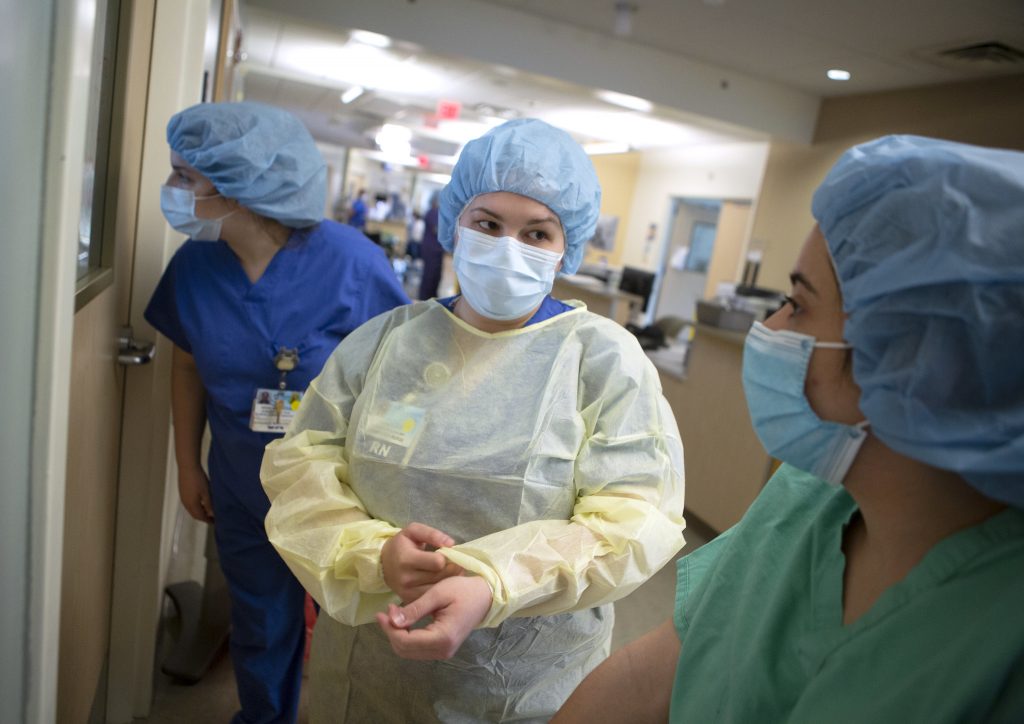As COVID-19 cases in Berks County steadily rise, local hospitals have responded by opening drive-thru testing sites, increasing bed capacity, and ordering additional protective equipment for staff. These are all necessary steps in combating the novel coronavirus, but what is it like to be a nurse or a doctor on the front line? To provide insight into day to day hospital operations, Penn State Health St. Joseph recently held a virtual conference chat for local news media to talk one-on-one with hospital staff.
https://www.facebook.com/bctv.org/videos/536058747284845/
Mimi Beck is a Critical Care Nurse who works directly with COVID-19 positive patients. “We’re seeing them when they are very ill and require intensive care” says Beck. She explains that her job is very physical, as patients often need help moving around. “It can be chaotic at times, they come into our unit very quickly, and deteriorate quickly, sometimes it can be a very busy day”.
“My typical day on the COVID unit involves taking care of 3-4 patients who are COVID positive or being ruled out for the virus” says Registered Nurse Patty Amin. Amin says one of her biggest challenges treating coronavirus patients is donning and doffing personal protective equipment after visiting each room. “It’s required a lot of change in care, as we now have a lot of forethought and think ahead before we go into rooms and group our tasks”.
Something that people may not be aware of is how much patients are isolated. “They need company when you’re in (the room). They need to talk, they need to be encouraged to make connections with their family” says Amin. “You just have to be very mindful about the day and every time you go into a room, what you might need, checking with a patient before going in. You want to be conscious of how much equipment you’re using and try to conserve.”
A lot has changed in the healthcare field recently, including how nurses and doctors protect themselves from the virus. Jenna Riley, a Nurse Educator, says the hospital is now providing staff with scrubs. Typically, staff would use their own scrubs and wash them at home. This change in policy protects staff from bringing the virus home. “We’re also provided PPE that includes a gown, N95 mask, surgical mask, and a face shield” says Riley.
“As it relates to practice out on the floors, what we’ve done is designate from our hospitalist team, a specific team for management of COVID patients” says Hospitalist Doctor Brian Reuter. “Those physicians don’t leave those units to keep care centralized to those patients.”
A question not often asked to frontline workers, what is the morale like among staff? Beck says morale is very good in her unit and everyone is very supportive of each other. “Management has been very good at providing us meals, going to the break room there is often pizza delivered”.
“It’s not always easy to take breaks when you’re in critical care” says Beck. “You have people who are ill and you can’t leave their bedside. In that respect, it’s difficult. We work 12 hour shifts, so it’s a long day, but I feel we are supported as far as taking breaks and trying to get relief. We also have people supporting us, so even if we can’t take a full break, someone else can step in.”
According to Amin, the hospital stepped in very early to provide staff with additional training and drills prior to admitting COVID patients. “Personally, staying on top of the latest news about COVID and treatments. I belong to a few Facebook groups, Nationwide Nurses, just to follow their stories and tips for caring for patients have been very helpful” says Amin. “Just trying to be supportive to other staff members as well, and on other units, some people have higher anxiety than others when caring for these patients so trying to be supportive.”
BCTV and Berks Weekly are working together to bring you the stories of our community during the COVID-19 pandemic. This media partnership is made possible in part by the support of Berks County Community Foundation.




